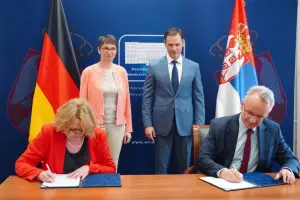- Serbia
Get to know Serbia
- Citizens
Culture and science
Health services
Pension and disability insurance
- Business
Employment
Economy
- Media
- Government
- Contact
Keep in touch
Contact form
Back
Keepin touch
Whether you have a question, comment, suggestion or any problem in the purview of the government, send us your message and we will try to respond as soon as possible. If your problem is not in our purview, we will forward your message to the relevant institution.
Q:
A:
Government working group, Serbian financial institutions to meet next week
Belgrade,
8 October 2008
State Secretary at the Ministry of Finance Slobodan Ilic announced today that a working group, formed by the government to monitor the situation on the world financial market, will hold a meeting next week with representatives of banks, investment and pension finds.
At a meeting devoted to the global financial crisis, organised by the Faculty of Economy and the Economist Media Group, Ilic said that the meeting will be held in order to determine the consequences of the itnernational economic crisis for Serbia’s financial institutions.
He said that Serbia’s task will be to prepare the budget for 2009, which will envisage a decrease in public spending and deficit in order to preserve macroeconomic stability, as well as regulations which will help develop the financial market.
According to him, Serbia is fulfiling its obligations, but Serbian parliament is not functioning due to a stalemate.
Governor of the National Bank of Serbia Radovan Jelasic said citizens should not worry about their savings in banks or withdraw them from bank accounts.
He explained that the Serbian banking sector is highly liquid because a third of the banks’ balance sum is in the required reserve, cash and quality securities.
Another guarantee of savings is the banks’ capital adequacy of 28%, which is much more than in developed countries, as well as the ownership structure in banks, according to which founders of 75% of banks in Serbia are from the EU, stressed Jelasic.
According to him, so far there are no reasons for the central bank to intervene in any way to protect the financial sector from the impact of the global crisis, or to reduce the required reserve of banks in order to increase their liquidity.
The Governor specified that the global financial crisis will reduce the volume of loans in Serbia and increase interest rates, thus creating a situation in which from one extreme, where citizens took far too many loans which they are not able to repay, the country will go to another one.
He said that Serbia’s task will be to prepare the budget for 2009, which will envisage a decrease in public spending and deficit in order to preserve macroeconomic stability, as well as regulations which will help develop the financial market.
According to him, Serbia is fulfiling its obligations, but Serbian parliament is not functioning due to a stalemate.
Governor of the National Bank of Serbia Radovan Jelasic said citizens should not worry about their savings in banks or withdraw them from bank accounts.
He explained that the Serbian banking sector is highly liquid because a third of the banks’ balance sum is in the required reserve, cash and quality securities.
Another guarantee of savings is the banks’ capital adequacy of 28%, which is much more than in developed countries, as well as the ownership structure in banks, according to which founders of 75% of banks in Serbia are from the EU, stressed Jelasic.
According to him, so far there are no reasons for the central bank to intervene in any way to protect the financial sector from the impact of the global crisis, or to reduce the required reserve of banks in order to increase their liquidity.
The Governor specified that the global financial crisis will reduce the volume of loans in Serbia and increase interest rates, thus creating a situation in which from one extreme, where citizens took far too many loans which they are not able to repay, the country will go to another one.
-
 Belgrade, 11 August 2025
Belgrade, 11 August 2025Support for agricultural projects worth RSD 750 million
-
 Belgrade, 21 July 2025
Belgrade, 21 July 2025Construction of oil pipeline with Hungary to begin early next year
-
 Belgrade/Athens, 17 July 2025
Belgrade/Athens, 17 July 2025Serbia continues to align with EU in field of energy
-
 Kostolac, 14 July 2025
Kostolac, 14 July 2025First solar power plant Petka in Kostolac put into trial operation
-
 Belgrade, 11 July 2025
Belgrade, 11 July 2025Potential for improving cooperation with Belarus in many areas
-
 Požega, 5 July 2025
Požega, 5 July 2025Section of Pakovraće - Požega highway officially opened
-
 Belgrade, 2 July 2025
Belgrade, 2 July 2025Technical specifications defined for Serbia-Hungary oil pipeline
-
 Belgrade, 30 June 2025
Belgrade, 30 June 2025IMF confirms Serbia successfully implementing all agreed reforms
-
 Belgrade, 27 June 2025
Belgrade, 27 June 2025Double Taxation Avoidance Agreement with Germany signed
-
 Kostolac, 25 June 2025
Kostolac, 25 June 2025Construction of Kostolac wind farm nearing completion
